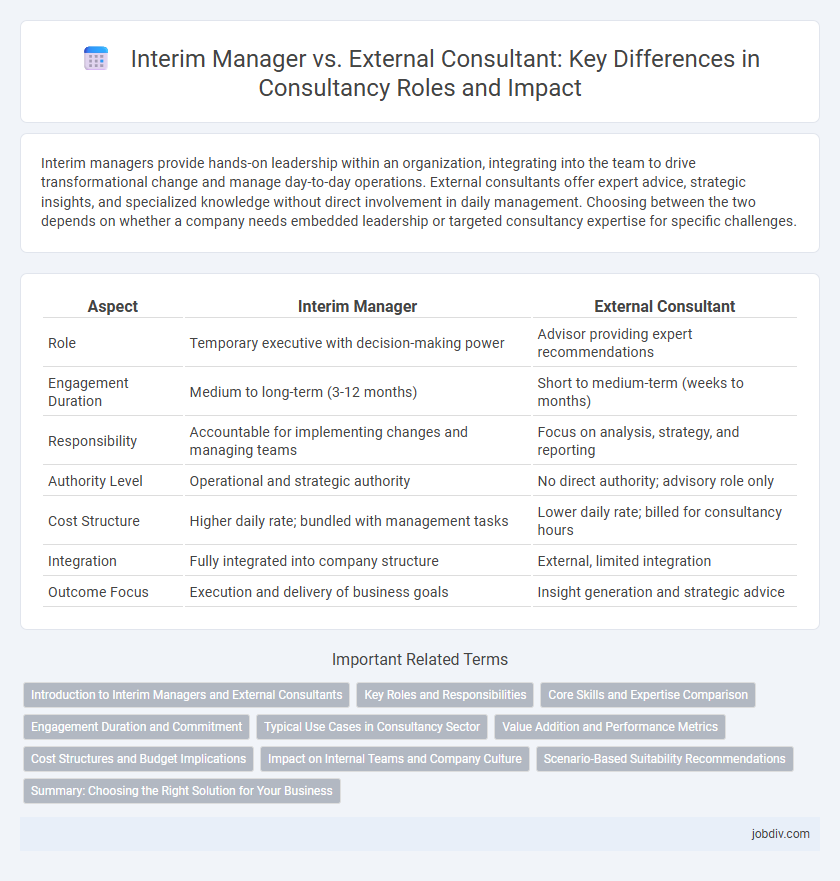Interim managers provide hands-on leadership within an organization, integrating into the team to drive transformational change and manage day-to-day operations. External consultants offer expert advice, strategic insights, and specialized knowledge without direct involvement in daily management. Choosing between the two depends on whether a company needs embedded leadership or targeted consultancy expertise for specific challenges.
Table of Comparison
| Aspect | Interim Manager | External Consultant |
|---|---|---|
| Role | Temporary executive with decision-making power | Advisor providing expert recommendations |
| Engagement Duration | Medium to long-term (3-12 months) | Short to medium-term (weeks to months) |
| Responsibility | Accountable for implementing changes and managing teams | Focus on analysis, strategy, and reporting |
| Authority Level | Operational and strategic authority | No direct authority; advisory role only |
| Cost Structure | Higher daily rate; bundled with management tasks | Lower daily rate; billed for consultancy hours |
| Integration | Fully integrated into company structure | External, limited integration |
| Outcome Focus | Execution and delivery of business goals | Insight generation and strategic advice |
Introduction to Interim Managers and External Consultants
Interim managers provide temporary executive leadership within organizations to manage transitions, crises, or specific projects, leveraging their industry expertise and decision-making authority. External consultants offer specialized advisory services, delivering strategic recommendations and problem-solving solutions without direct operational control. Both roles enhance organizational performance, yet interim managers assume hands-on management responsibilities, while external consultants primarily focus on analysis and guidance.
Key Roles and Responsibilities
Interim managers are appointed to provide hands-on leadership during transitional periods, making strategic decisions and managing day-to-day operations to ensure organizational stability. External consultants offer specialized expertise and objective analysis, delivering recommendations and solutions without direct involvement in daily management. Both roles complement each other by addressing immediate operational needs and long-term strategic goals within consultancy projects.
Core Skills and Expertise Comparison
Interim managers demonstrate strong leadership skills with a focus on operational execution, crisis management, and team integration, often stepping into active roles to drive immediate business results. External consultants bring specialized expertise in strategic analysis, problem-solving, and industry-specific knowledge, providing recommendations and frameworks without direct operational involvement. Both roles require deep domain knowledge, but interim managers prioritize hands-on management and decision-making, while external consultants emphasize advisory capabilities and project-based insights.
Engagement Duration and Commitment
Interim managers typically engage with organizations for extended periods, often ranging from several months to over a year, offering sustained leadership and hands-on involvement in daily operations. External consultants usually have shorter, project-based engagements that focus on delivering specific insights or solutions without ongoing operational responsibilities. The level of commitment from interim managers is deeper due to their embedded role, while external consultants maintain a more advisory and temporary presence.
Typical Use Cases in Consultancy Sector
Interim managers are typically deployed for hands-on leadership roles during organizational transitions, such as restructuring, crisis management, or project implementation, where immediate decision-making authority is needed. External consultants are engaged for specialized expertise, strategic advice, and objective analysis in areas like market research, process optimization, or compliance audits without direct management responsibilities. Companies leverage interim managers for operational continuity and quick results, while external consultants provide frameworks and recommendations to guide long-term strategy.
Value Addition and Performance Metrics
Interim managers deliver value by integrating directly into leadership roles, driving immediate operational improvements and accountability through measurable KPIs such as project completion time and team productivity. External consultants contribute value through specialized expertise and strategic insights, with performance metrics often focused on recommendation implementation rate and cost-benefit analysis. Both roles enhance organizational performance, but interim managers emphasize execution and daily management, while external consultants prioritize advisory impact and transformational strategies.
Cost Structures and Budget Implications
Interim managers typically incur fixed monthly fees tied to the project's duration, offering predictable budgeting and direct accountability within the organization. External consultants often charge hourly or daily rates, which can lead to variable costs depending on project scope and consultant engagement levels. Choosing between interim managers and external consultants depends on the organization's need for cost predictability versus flexible expertise allocation.
Impact on Internal Teams and Company Culture
Interim managers integrate directly into internal teams, driving change through hands-on leadership and fostering alignment with company culture. External consultants provide specialized expertise and strategic recommendations without direct team integration, which may limit their influence on daily operations and cultural dynamics. The choice between the two affects how effectively knowledge is transferred and how internal teams adapt to new initiatives.
Scenario-Based Suitability Recommendations
Interim managers excel in scenarios requiring temporary leadership to drive change, maintain operations, or manage crises within an organization. External consultants are better suited for projects needing specialized expertise, strategic assessments, and independent analysis without direct operational control. Selecting between the two depends on the organization's immediate goals, scope of intervention, and need for hands-on management versus advisory support.
Summary: Choosing the Right Solution for Your Business
Interim managers integrate into your organization to provide hands-on leadership and drive change from within, offering immediate operational control and accountability. External consultants deliver specialized expertise and strategic advice, enabling objective insights without direct management responsibilities. Selecting the right solution depends on your business's need for internal leadership versus external strategic guidance to achieve specific goals efficiently.
Interim Manager vs External Consultant Infographic

 jobdiv.com
jobdiv.com